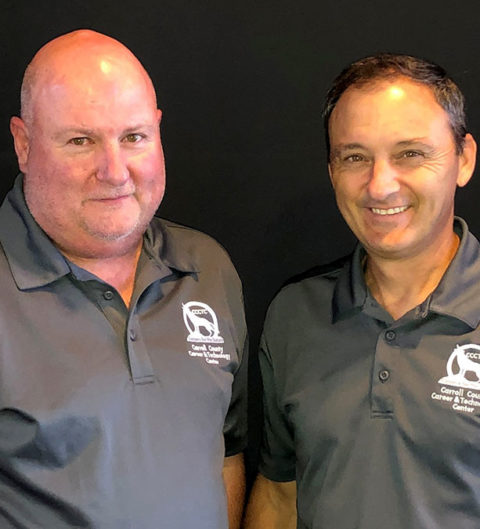“The pride and satisfaction that comes from a completed masonry project is seldom matched by other trade work. Students know the value of perfection.”
—Michael Campanile
Michael Campanile and Michael Schweinsberg, who applied for the 2019 Harbor Freight Tools for Schools Prize for Teaching Excellence as a team, both got an early start in the trades. Campanile is a fifth-generation mason who started working for his father’s construction company as a teenager. After 22 years in industry, and a significant amount of time spent training apprentice masons, Campanile decided to become a teacher. Schweinsberg too took up trades as a teenager, when he worked as a farm hand, learning multiple skills including welding. After working in industry, he transitioned to become a teacher at his alma mater, the Carroll County Career and Technology Center in Westminster, Maryland.
Both Campanile and Schweinsberg have taught at CCCTC for the past 15 years. Between them, they have more than a dozen certifications and association leadership roles—Campanile is vice president of the local Masonry Instructor Association, and Schweinsberg is an American Welding Society-certified welding inspector. Both are certified by the National Center for Construction Education and Research (NCCER). Their students have the chance to earn many of their own certifications through NCCER, and to obtain dual credits at the Pennsylvania School of Technology, preparing them well for careers ranging from bricklaying and tile setting to ship and aircraft building.
Masonry students start by practicing a beginning skill set until they master it. Along with the welding students, they spend several hours each day in the shop. As Campanile notes, while 77 percent is a passing grade, a customer might not pay for work that is only 77 percent correct. Once masonry students develop mastery, they build custom mailboxes, fireplaces, fire pits and brick ovens for customers. Welding students also build products and operate a business, learning to make blueprints, source material, and fabricate and finish a product. Both teachers take students to regional and national competitions, and the masonry students have won gold, silver and bronze at the state level SkillsUSA competition.
Campanile and Schweinsberg’s students are well prepared for future trades careers. Campanile said that masonry is in high demand, particularly because it is a skill that few homeowners can develop on their own. One of Campanile’s former students runs his own business and employs four other former students. Schweinsberg invites local business partners to the shop regularly, and notes that masonry and welding students are often in demand even before they graduate.
“Seeing the success of students in their welding abilities as they use these skills that end up being their livelihood is what I love most about being a skilled trades teacher.”
—Michael Schweinsberg
